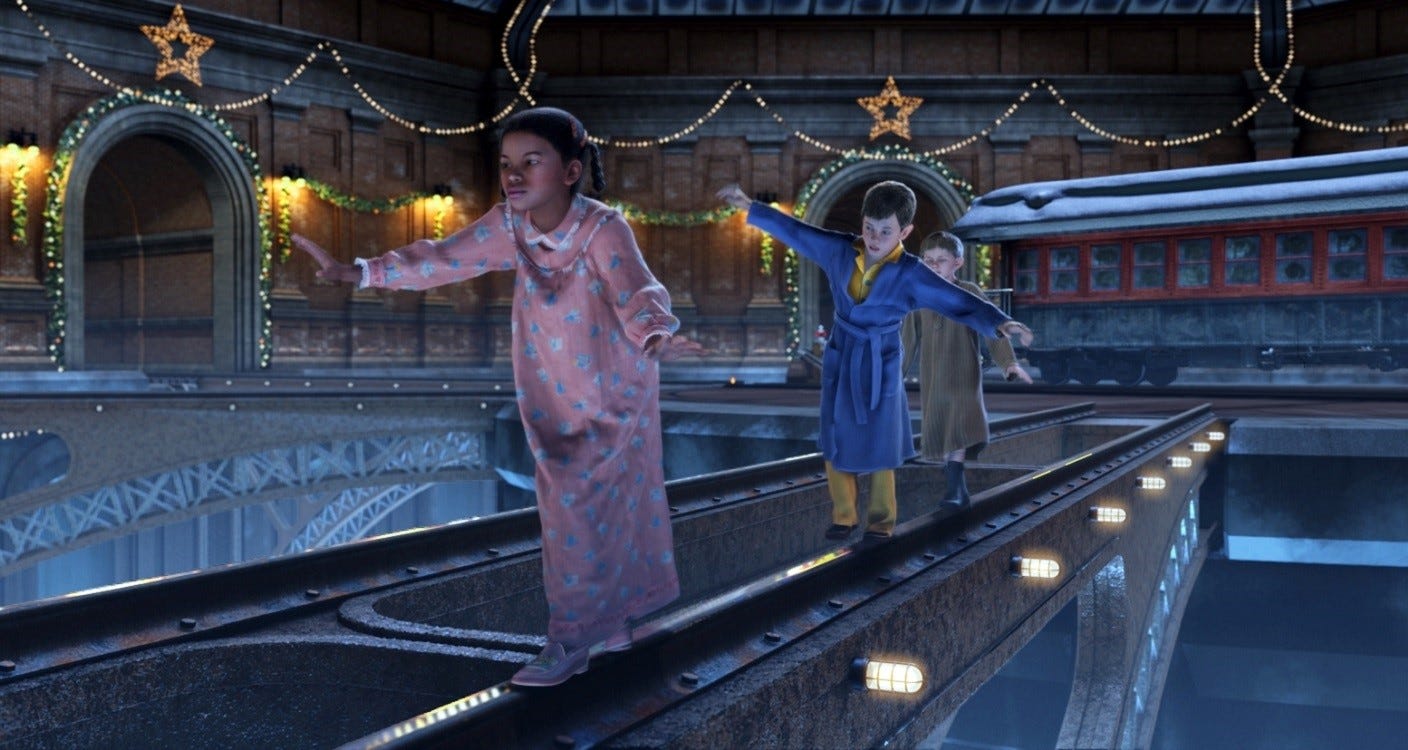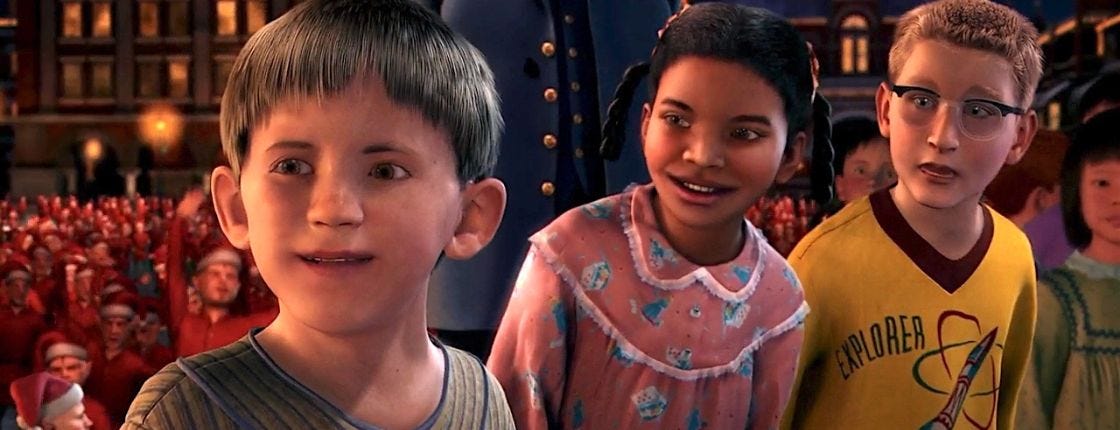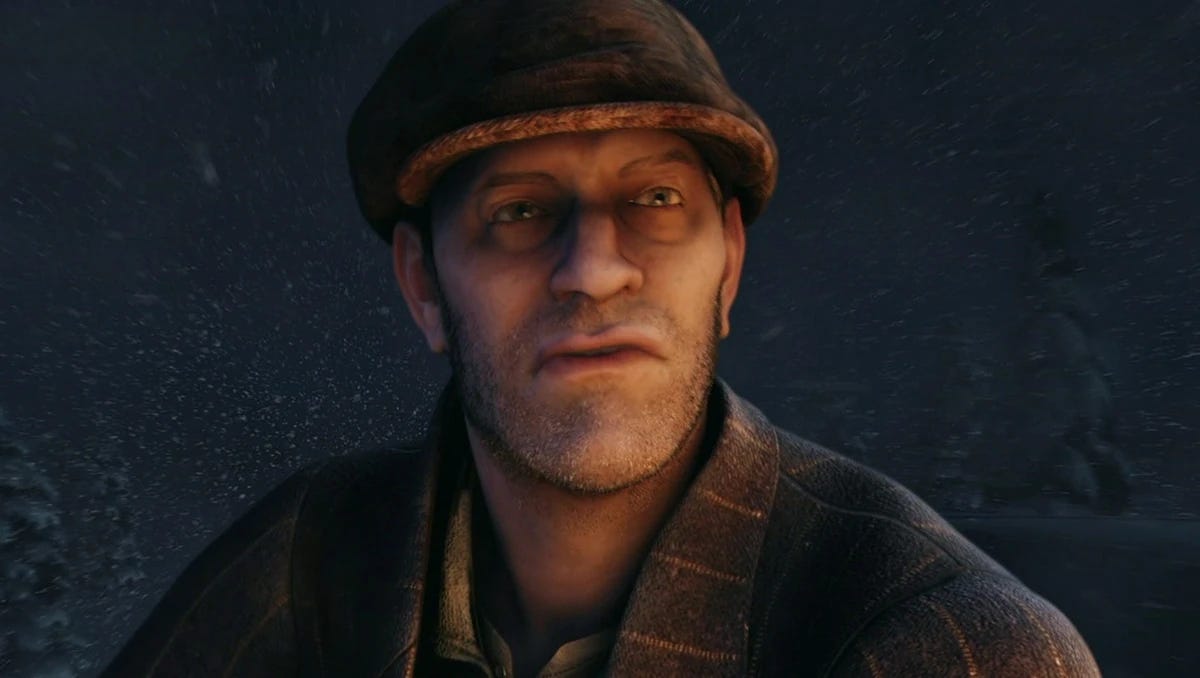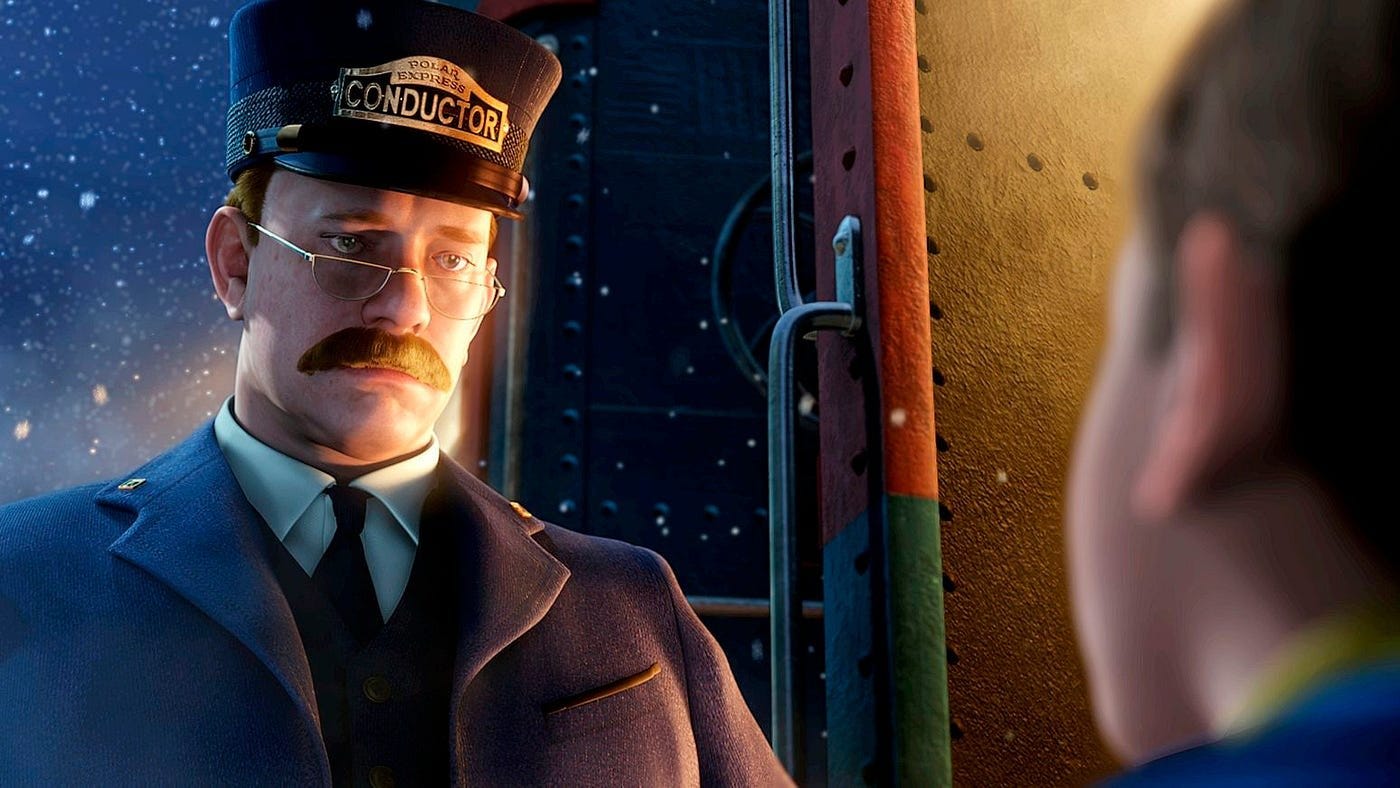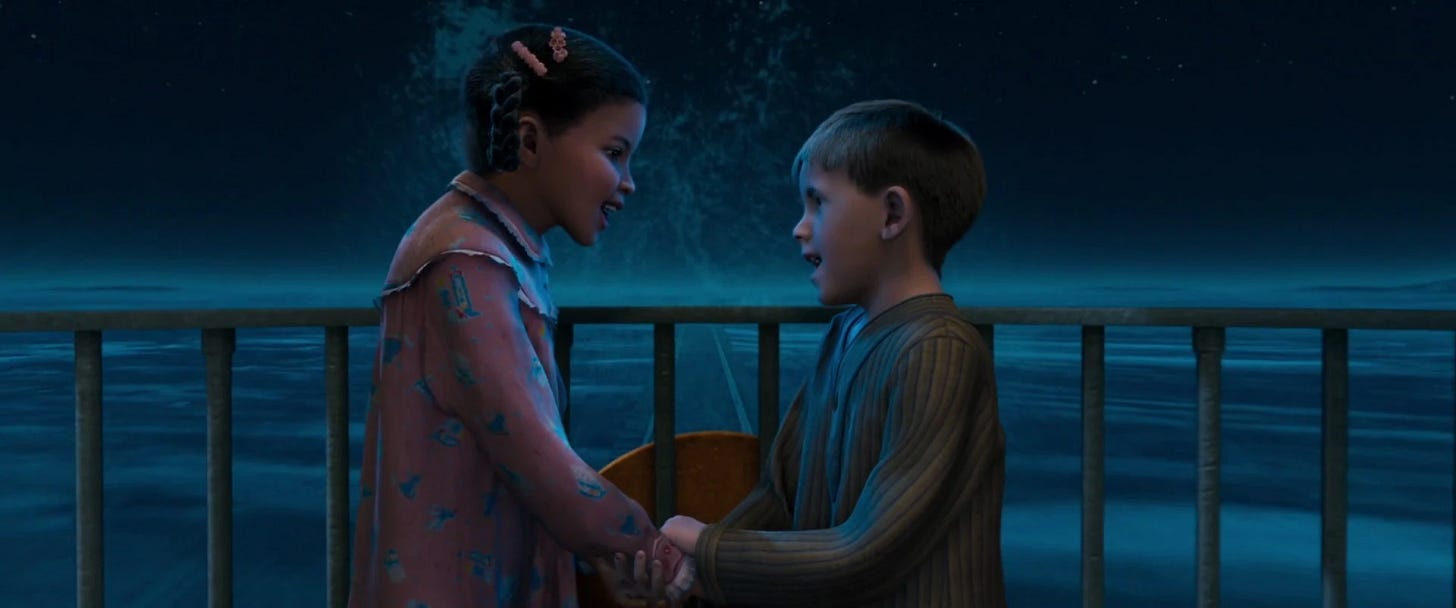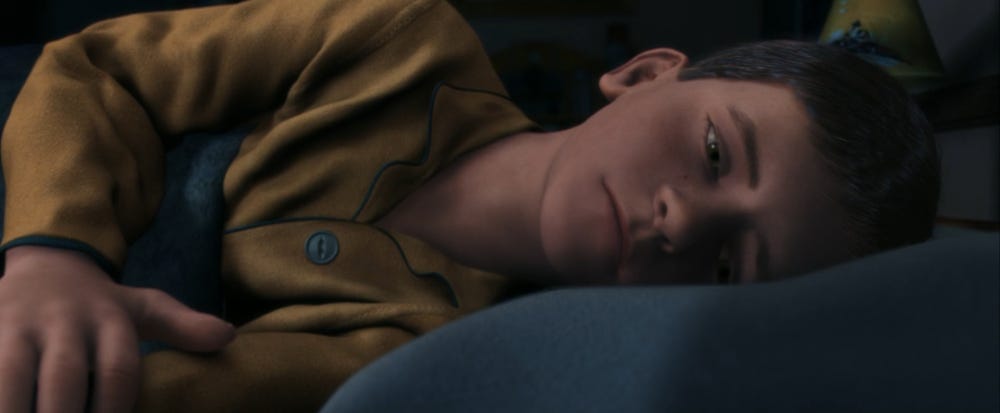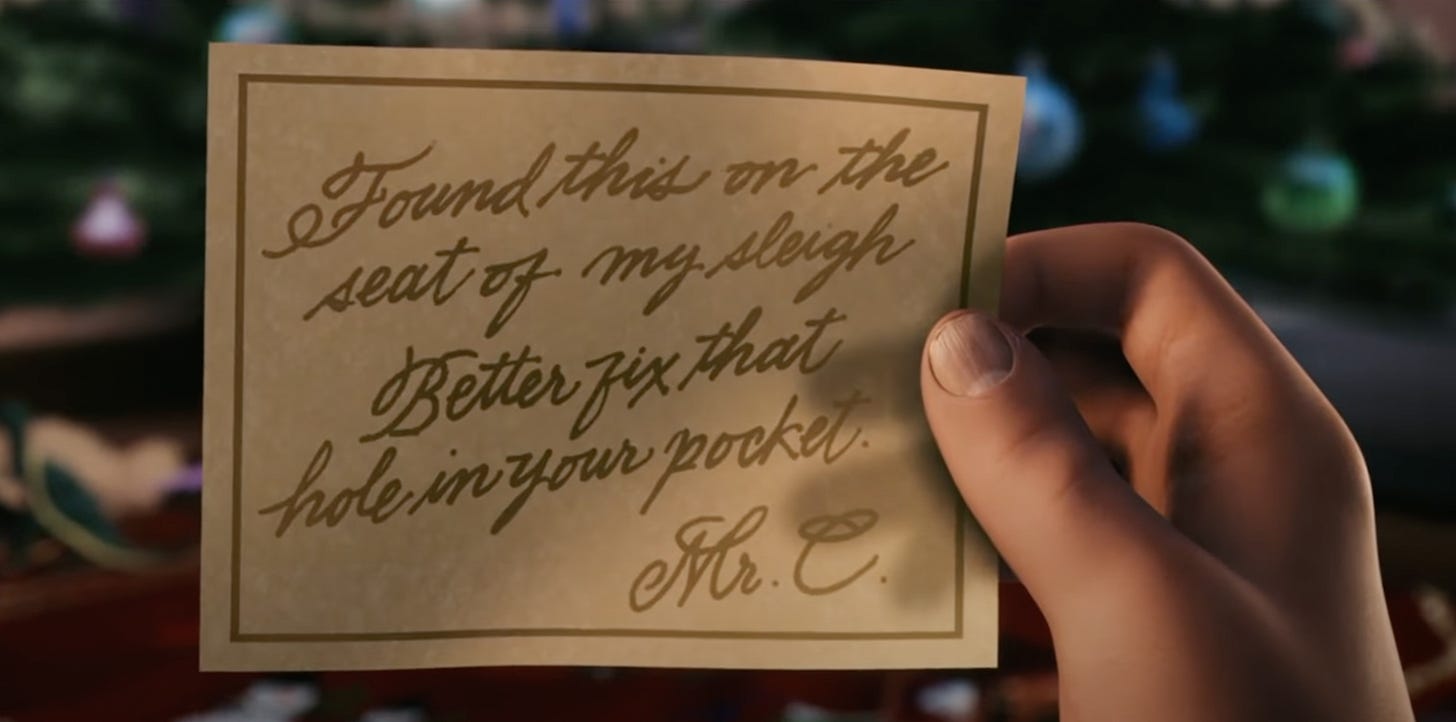The Polar Express
One thing about trains: It doesn't matter where they're going. What matters is deciding to get on.
(This newsletter is too long for email. Read the full newsletter at moviemondayswithgina.substack.com)
"Well, are you coming?" is the first thing the Conductor says to the main character in The Polar Express, and it's the most important question of the film. I saw a tweet last year that said, "The Polar Express should be rated R and put in the horror/psychological thriller category," and I don't know if I've ever agreed with anything I've seen on Twitter more.
From the creepy ghost on the top of the train to the eerie elves at the North Pole, there's a sinisterness in The Polar Express that no other Christmas movie carries. Even the colors in The Polar Express are much darker than those of other Christmas films like when the characters arrive at the North Pole. It is not as jolly as in other films, and the whole movie taking place at night only adds to this gloominess.
I almost didn't write about The Polar Express because I'd already analyzed it in 2020 for The Daily Fandom. However, I decided to give a fresh take on it three years later because I can't think of any other Christmas movie that better represents the message of the holiday. And since this letter is going out on Christmas Day, I'm diving into The Polar Express once again.
Though it's been 19 years, I remember going to the movies to see The Polar Express for the first time and loving it so much that I went to see it in theaters a second time. In 2004, the CGI technology used to create the characters was a huge deal, and while it might look dated today, at the time, it was more advanced than any other animated movie I'd seen (this was five years before James Cameron's first Avatar film was released.)
Since then, The Polar Express has become a Christmas classic. I even own the Lionel Polar Express train that goes around the Christmas tree, and I went on the real-life Polar Express train ride experience a few years ago. However, it was a lot more cheerful than the film. While there are many lighthearted moments, like some of the musical numbers, there's also a lot to The Polar Express that seems far too complex for any child to understand, which is why I love revisiting The Polar Express every year to see what stands out to me that didn't the year before.
Hero Boy & The Friends He Makes
Hero Boy, the nameless main character, sets the story into motion when The Polar Express begins, and he's already questioning his faith in Santa Claus. As his younger sister Sarah gets ready for bed, excited about Santa coming, Hero Boy is busy reading newspapers and magazines, looking for evidence that will support his doubts about Santa's existence. From the start, The Polar Express, without having Hero Boy utter one word, introduces him as someone who lacks the ability to believe in the things he can't see. This is why the Polar Express shows up outside his house right as he's falling asleep.
I always wondered why his sister Sarah wasn't awakened by the train, but it's clear from the start that Sarah already believes, so there's no reason she needs to get on the train to the North Pole. Hero Boy, on the other hand, has a lot that he needs to learn. However, Hero Boy didn't have to go looking for the train, the Polar Express came to him when he needed it most. This seems to happen with a lot of things in life. When we're ready to learn a lesson or when we're ready for something new, it seeks us out.
“There’s no greater gift than friendship”-Santa, The Polar Express.
Although he initially declines the Conductor's invitation, Hero Boy decides to take a leap of faith and get on the train as it's pulling away. Here's what I find interesting. Even though Hero Boy has to get on the train in order to learn how to believe, the Polar Express doesn't wait for him. As the Conductor tells him toward the end of the film, it's his decision whether or not to get on, meaning it's up to Hero Boy to decide if he is going to have faith or if he will continue on in a life of doubt and cynicism.
As soon as Hero Boy gets on the train, we're introduced to the friends who will join him on his journey and who have their own lessons to learn. We meet my favorite character first, Know-It-All, when he pops up from the seat in front of Hero Boy and starts doing what he does best, explaining something like he knows better than anyone else. My favorite memory of Know-It-All was one Christmas when my dad came into the living room while me and my mom were watching The Polar Express and said, "he kind of looks like me," and we both started laughing because we'd already been saying that to each other the whole time.
Next, Hero Boy meets Hero Girl. She's one of the most interesting characters on the train because she has the potential to be an incredible leader. She has a strong belief in Santa Claus and seems very sure of herself. However, she allows other people to doubt her, and as a result, she begins to doubt herself. A huge turning point for Hero Girl is when she leads her friends through a tunnel in the North Pole, and when Hero Boy questions if she's sure they're going the right way, she tells him, "absolutely."
Billy is the last character to get on the train and the first to get off in the end. Like Hero Boy, he lacks faith and belief, but for different reasons. It's clear from Billy's pajamas, his home, and Know-It-All's comments– "We're headed for the other side of the tracks"–that Billy comes from a much poorer family than the other kids on the Polar Express. Billy struggles to believe in the magic of Christmas because he never has as much as everyone else does, and as he mentions several times, things don't seem to work out for him like they do for other people.
Like Hero Boy, Billy hesitates to get on the train but is able to climb on when Hero Boy stops the train, to the Conductor's dismay, so that he won't miss it. It's clear from this moment that the children were meant to help each other, and they will continue to have a massive impact on each other's journeys. When the Polar Express arrives at the North Pole, Billy even hesitates to get off the train because he still doesn't believe things will work out for him.
Christmas is such a wonderful and beautiful time! A time for giving and being thankful-Hero Girl, The Polar Express.
However, when Hero Boy, Hero Girl, and Billy wander off from the group, they go on an adventure of their own, which escalates when Billy chases after a present with his address on it. Billy clings to this present, unable to let it go because he has so little in his life that when he sees something for him, he's afraid to let it go. He's even afraid to give the present to the elf when they make it back to the group because he can't trust that Santa will deliver the present to his house.
This is how we act toward a lot of things in life. We grasp tightly to things because we're afraid that if we let go, we will lose them. The truth is, when we let go, that's when the magic happens. As The Polar Express showcases, Billy lets go of his gift, and when he arrives back home, he runs out on his porch, showing his friends on the train that Santa did, in fact, deliver his present to his house.
However, Billy only got there by learning to trust others, which is why when the Conductor punches his ticket, it reads "Depend On. Rely On. Count On." Hero Girl, on the other hand, is reminded that she is a natural leader when the Conductor gives her a ticket that says "Lead." To no one's surprise, Know-It-All's ticket teaches him that while he may know a lot of things about a lot of things, he doesn't know everything. His ticket says "Learn" as a reminder that there is always more to learn, and he actually did learn a lot from his experience on the Polar Express, even if it seemed like he spent the whole trip trying to educate everyone else.
Though, the most crucial lesson lies in Hero Boy's ticket, which says, "Believe." Hero Boy's entire journey was meant to lead him to have faith in the unseen. There were several moments where we watched Hero Boy's faith increase, but the most crucial was when he picked up the bell that fell off a reindeer's reigns. Hero Boy wasn't able to see Santa when he arrived, even though all the other kids on the train saw him.
Frustrated with his own doubt, Hero Boy closed his eyes and told himself he believed. When he opened his eyes, he saw Santa's reflection in the bell, proving he was finally able to believe. As Santa was leaving, Billy questioned if the whole experience was just a dream and it was Hero Boy who reassured him that it wasn't.
The most emotional part of The Polar Express is when Hero Girl hugs Hero Boy goodbye as he's getting off the train. They seem to have an unspoken agreement that they may never see each other again, but they will never forget how they all came together that night for a journey that no one else will ever understand. Because of each other and the lessons they learned on the Polar Express, they will never be the same.
An Evangelical Interpretation: The Journey Of Faith
Something I find very fascinating is how many people have interpreted The Polar Express as an evangelical story. This was certainly not Chris Van Allsburg's intention when he wrote the original book, as a lot of the aspects of the film were absent in his story. However, even as someone who is not religious myself, it's hard to ignore all the reasons some believe The Polar Express is heavy in religious messages.
One of the film's screenwriters, William Broyles Jr. claims he didn't intentionally make the film an evangelical movie, but the man behind the film's marketing, Paul Lauer (also the man behind the marketing for The Passion of the Christ, The Bible Series, and Son of God) seems to think otherwise. According to a Slate article, Lauer received endorsements for The Polar Express from pastors, and there's even a family Bibly-study guide to go along with the film.
“Seeing is believing, am I right?”-Hobo, The Polar Express
There are a lot of things in The Polar Express that don't quite make sense, like the importance of the tickets and the Conductor's preoccupation with time. Of course, the tickets give the kids their special messages at the end of the movie, and the Conductor wants to make it to the North Pole before Santa has to leave. However, according to the Slate article, some compare the importance of the ticket and Hero Boy desperately trying to return it to Hero Girl to Jesus dying for our sins. "The Boy risked it all to recover the ticket. Jesus gave His all to save us from the penalty of our sins."
The biggest clue there could be a religious message behind The Polar Express is Hero Boy is struggling with faith, and he must go on a journey so that he can learn to believe. For me, this doesn't necessarily have anything to do with religion, as we can all find something to believe in even if we don't follow recognized religions. However, there's something very eerie and complex about the ghost Hobo, who rides on top of the train. Hero Boy meets him when he's trying to return Hero Girl's ticket to her. Like the train, Hero Boy isn't looking for the Hobo; he just shows up.
Hobo seems to be a manifestation of Hero Boy's doubts, but simultaneously, he pushes Hero Boy to believe. Some have interpreted him to be the Holy Spirit, citing a scene when Hobo saves Hero Boy from falling off the train as proof that he is there to protect Hero Boy and make sure he makes it to the North Pole. There is even a scene where the Conductor mentions he was saved from falling off the train on his first Christmas Eve trip. Hero Boy asks if someone saved him, and he promptly responds, "or something," suggesting Hobo may have been the one to save him.
I always felt a lot of the characters in The Polar Express were potentials for Hero Boy to grow into (which is why they were all voiced by Tom Hanks.) If he learned to believe, he could be like the Conductor who helped other people believe. If he continued to not believe, he could end up like the cynical Hobo who sits on top of the train and taunts other doubtful children. When Hero Boy first meets Hobo, he calls himself the King of the North Pole before mocking Santa Claus and testing Hero Boy's faith by asking him if he believes in him.
Another dark scene connects Hobo to A Christmas Carol, suggesting he could be a representation of one of the ghosts that visit Ebenezer Scrooge. When the Conductor leads Hero Boy and Hero Girl into a room full of abandoned toys, Hobo sits on top of the train, controlling a Scrooge puppet to once again mock Hero Boy's lack of faith.
However, the strongest argument pro-evangelical The Polar Express fans make is that Hero Boy's meeting with Santa is very unlike other Christmas films' portrayals of the mystical character. Take a look at Santa Claus Is Coming To Town, Elf, or Disney's The Santa Clause trilogy, and you will see a jolly man with rosy cheeks, a red suit, and a cheerful demeanor.
In The Polar Express, Santa Claus seems larger than life and always appears with a white aura surrounding him. Evangelists believe this is proof Santa is supposed to be Jesus. I even watched a YouTube video where user Cinema Terrana compared the scene where Hero Boy meets Santa to the story of Thomas.
“Years ago, on my first Christmas Eve run. I was up on the roof making my rounds, when I slipped on the ice myself. I reached out for handle, but it broke off, I slid and fell off, and yet I did not fall off this train.”-Conductor, The Polar Express.
Thomas doubted the Resurrection of Jesus and demanded physical proof of the wounds of Christ's Crucifixion in order to believe. This is a lot like how everyone else believed in Santa and was able to see him except for Hero Boy. Instead, he had to demand to see Santa by holding the bell and telling himself he believed. When Santa showed up, and Hero Boy physically saw him, he was finally able to believe. For the other children, they didn't need to see Santa in order to believe in him.
There's also a scene where Santa meets Hero Boy, Hero Girl, Billy, and Know-It-All. While he advises that Know-It-All gain some humility, he compliments Hero Girl on her confidence and Christmas spirit and applauds Billy for making friends. As he towers over the children, glowing in white light, it seems as if he's blessing them with his words.
I know very little about religion, and if the screenwriters behind The Polar Express deny intentionally making it a religious film, I'm going to take their word for it. However, I do believe The Polar Express is a deeply spiritual film, and if evangelists want to interpret it to fit their religion, that's their prerogative.
The Polar Express is a journey to believing, which is why the passengers face so many obstacles on their way to the North Pole. Whether their trip is delayed because Hero Boy stops the train so Billy can get on, or the entire train nearly goes underwater when a frozen lake begins to crack, The Polar Express suggests there may be some difficulties on the journey to faith, but if we keep believing and we keep going, we'll eventually end up at our destination.
The last we see of Hobo is when Hero Boy gets off the train, and Hobo is sitting on top of the Polar Express, waving goodbye to him before disappearing into the snow. At this moment, it seems the evangelists were right. Hobo was not a villain, but he was meant to guide Hero Boy to believe. When Hero Boy waves back at him, it's like he is saying goodbye to his doubts and stepping into his faith.
The Music Of The Polar Express
The Polar Express converted Chris Van Allsburg's story into a musical with extravaganzas like "Hot Chocolate" and "The Polar Express," which were reminiscent of Disney numbers like "Be Our Guest" and "Under The Sea." However, The Polar Express also includes the number "When Christmas Comes To Town," which feels like the "Want" song Howard Ashman used to talk about.
Billy is singing about wanting to understand the Christmas magic that everyone else seems to experience, and Hero Girl is teaching him how to believe in it the way she does. In this scene, we see the first speck of Hero Boy and Billy starting to believe. After the song, the Conductor joins them and points out the Northern Lights, which look so magical that Billy and Hero Boy can't help but be excited.
There are a few other Christmas songs that play throughout The Polar Express, though they aren't musical numbers. Then, after Santa departs the North Pole, there's an odd and unexplained performance of "Rockin' on Top of the World" by Steven Tyler in elf form. However, the most important song in the film is Josh Groban's "Believe," which plays during the credits of the film but uses music from the score, which plays all throughout The Polar Express. The song captures the true meaning of the film and feels like it comes from the perspective of a grown-up Hero Boy who is advising other children to believe.
The Bell
Of all the symbolic aspects of The Polar Express, the bell holds the most meaning. It's the bell that teaches Hero Boy to believe because initially, he doesn't hear it ring, but when he tells himself, "I believe," the bell rings loudly. It's also the bell that allows Hero Boy to see Santa for the first time.
It's the bell that Santa gives Hero Boy as the first gift of Christmas, which seems to be a reward for him finally believing. Sadly, it's the bell that Hero Boy loses when he puts it in his robe pocket, forgetting that he ripped it when he was getting out of bed to go outside and see the Polar Express.
“At one time, most of my friends could hear the bell, but as years passed, it fell silent for all of them. Even Sarah found one Christmas that she could no longer hear its sweet sound. Though I've grown old, the bell still rings for me, as it does for all who truly believe”-Hero Boy, The Polar Express.
I believe there's a lot of significance to Hero Boy losing the bell. When the Conductor is handing everyone their tickets with their messages, each child reads their message back to the Conductor. When Hero Boy attempts to do the same, the Conductor interrupts him, saying, "It's nothing I need to know."
The point is that Hero Boy doesn't need to prove his belief to anyone. He doesn't need the bell as evidence because he believes in his heart that the experience on the Polar Express happened. However, when Hero Boy sees Billy got his present from Santa, he seems to have faith that Santa could return his bell to him, too. This is exactly what happens at the end of the movie.
“This bell is a wonderful symbol of the spirit of Christmas - as am I. Just remember, the true spirit of Christmas lies in your heart”-Santa, The Polar Express.
Of course, the most crucial aspect of the bell is that only those who believe can hear it ring. Hero Boy doesn't hear the bell ring until he convinces himself to believe. It's then shown that his parents think the bell is broken, and Hero Boy notes that his sister Sarah and his friends all grew up and stopped being able to hear the bell. However, he never stopped believing, so for all the Christmases to come, he could always hear the bell, as could everyone else who never stopped believing.
Was It All A Dream?
The biggest question in The Polar Express is, was it all just a dream? What's always stood out to me is how The Polar Express feels like the kind of weird dream you would have as a child on Christmas Eve. I remember being excited yet simultaneously nervous every Christmas Eve going to sleep, knowing Santa was on his way. The Polar Express perfectly encapsulates the contrasting emotions of excitement and eeriness that I remember so vividly.
If it was a dream, this could be another possible reason why Tom Hanks voiced most of the characters because everyone Hero Boy met was just a projection of himself. There's even a deja vu-like scene at the end of the film when Hero Boy runs downstairs to open his presents from Santa but rips the opposite pocket of his robe on his bed, which is the exact same thing that happened at the beginning of the movie. However, like I mentioned in my newsletter for The Wizard of Oz, I believe it really doesn't matter if it was a dream or not. What matters is whether or not Hero Boy believes what happened is true, and he does, which makes it real to him.
I was recently scrolling through TikTok when I came across a video of Sal Vulcano from Impractical Jokers on his podcast telling his co-host Chris Distefano about the time when he and his sister were children, and they looked out their window and saw Santa and his reindeer fly across the moon. He says he and his sister maintain this story to this day even though they understand that, logically, it does not make any sense.
"Seeing is believing, but, sometimes, the most real things in the world are the things we can't see,"-Conductor, The Polar Express.
The point isn't whether or not this happened or if they both hallucinated it together; the point is they believe that what they experienced really happened. For me, I always believed the real Santa was and will always be Charles Edward Hall, who played Santa Claus in the Radio City Christmas Spectacular for 36 years. When I found out he had retired at the end of 2022 and wouldn't be in the 2023 Christmas show, I messaged him on LinkedIn to thank him for always making Christmas so special, and he sent me back a very kind message, signed Santa Charles.
The Polar Express and the entire Christmas season are all about believing in something without any logical explanation or concrete evidence. Maybe Hero Boy's experience really was a dream, but that doesn't make it any less significant, and it doesn't take away from the truth that Josh Groban sings about in his song, "You have everything you need if you just believe." Merry Christmas, thank you for helping me end my year with 400 newsletter subscribers, and maybe I will see you back here next Christmas with an updated analysis of The Polar Express.




